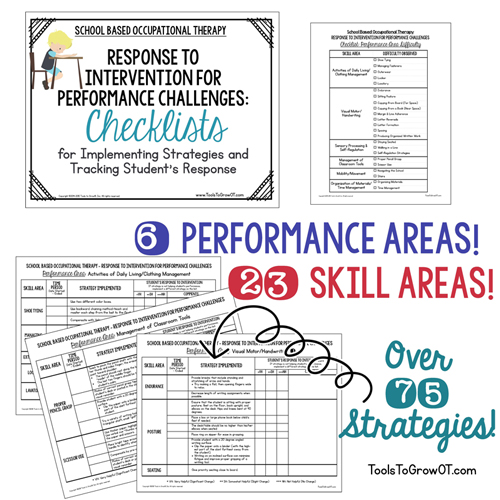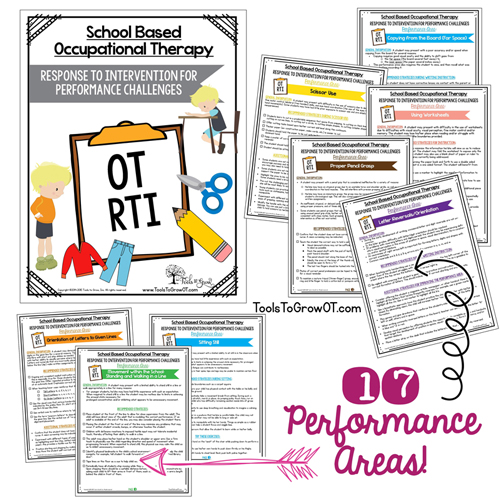The Possible Roles of Occupational Therapy within the Response to Intervention Model
11.08.2015
When the Individuals with Disabilities Act was reauthorized in 2004, experts from different disciplines noted that the special education system in the United States represented a “wait-to-fail” model. Experts reported the benefits of intervening at an earlier stage, and within regular education, to help struggling students before they reached the point of significant educational deficits. So as to rectify this problem, the focus shifted to providing quality interventions within the regular education environment in public schools, followed by case-by-case educational decision making based on the student’s response to high-quality research-based interventions.
Although various states may use different terms and structures, this multi-tiered system of early intervening services designed to promote school success is known as Response to Intervention. The intent is to move from a reactive model in which public school students had to seriously deteriorate before being moved on to special education programs, to one that emphasizes early and high-quality interventions in regular programs.
Response to Intervention programs address both the academic and behavioral health needs of all students, particularly those at risk. For optimal success this approach requires collaboration from all school personnel.
The Response to Intervention model involves:
- Universal screenings- school wide and classroom specific to determine whether students are learning the curriculum and/or whether behavioral performance is commensurate with the expectations established for the age and/or grade of the students
- Universal interventions- such as a school-wide positive behavior support programs
- High-quality, evidence-based instructional methods and interventions based on student’s needs
- Data collection and data- based decision making to make important educational decisions
- The use of data for preventing over identification of students with disabilities and to increase early identification and intervention for student’s with academic and/or behavioral difficulties
- Progress monitoring to assess learning rate and performance over time
The framework has three prevention levels or tiers, with interventions that are increasingly intense as you move from tier one (students at low risk for failure) to tier three (students at high risk). These levels of intensity move from school wide, to small group, and then to individual interventions as needed. The focus is on those students within general education who may not yet be identified for special education services, but are struggling with behavior and/or academics that impact learning.
Research has demonstrated that for both learning and behavior, 80% or more of students should be performing at expectations established for the first tier of instruction and support. Targeted intensive prevention or remediation for some students may be initiated if their performance or rate of progress is determined to be less than adequate. Once these students are identified, school-based problem-solving teams, composed of professionals from a variety of different professional disciplines, and ideally occupational therapy, may exist to provide strategies for addressing the needs of these students.
So as to advocate for and explain the role of school based Occupational Therapists within this approach, the American Occupational Therapy Association (AOTA) has developed a collection of Response to Intervention resources (e.g., consumer brochure, practice advisory, FAQ). Response to Intervention resources can be found on the AOTA Web site at http://www.aota.org/Practice/Children-Youth/School-based/RTI.aspx
As a primary service under Part C of the Individuals with Disabilities Education Improvement Act of 2004 (IDEA), Occupational Therapists collaborate with early childhood and school teams to promote physical, communication, cognitive, adaptive, and social-emotional development. Occupational Therapy is also a related service under Part B of IDEA and a pupil service under Elementary and Secondary Education Act (also known as No Child Left Behind).
As a member of the Response to Intervention problem solving team, Occupational Therapists can play an important role in this pro-active approach. Below are some examples:
- Conduct a professional development workshop for educators on a variety of relevant topics such sensory processing, self-regulation strategies, handwriting, visual motor development, visual perception, classroom environmental modifications, fine motor development, assistive technology, or executive functioning. This is an example of a Tier 1 intervention.
- Conduct screenings in areas such as handwriting and/or fine motor development. This is an example of a Tier 1 intervention.
- Implement Prevention Groups that use the foundations of sensory and motor development to support academic success.
- Consultation with Teachers to address specific deficits within a group of students. This may also include modeling the use of differentiated strategies to improve performance in the following areas:
1. Handwriting: for example, demonstrate the benefits of using modified handwriting paper
2. Attention & Focus: for example, demonstrate the use of class-wide self-regulation strategies
3. Adaptive Self-Help Skills: for example, demonstrate backward chaining or simple adaptations for improving the use of fasteners
4. Tool Use: for example, demonstrate the effects of using different pencils, grips, slant boards, visuals reminders/posters
5. Executive Functions: for example, demonstrate how to modify a daily planner/calendar, understanding the passage of time, prioritization
- Consultation with Teachers to examine classroom environmental design. This may include modifications to seating, lavatories, and lockers, as well as the use of visuals as learning aides. This is an example of a Tier 2 intervention.
Whether you are an established member of the Response to Intervention team, or just initiating the role of Occupational Therapy in this model, Tools to Grow offers a wide variety of resources to support the efforts of Occupational Therapy in this early intervening service model.
Tools to Grow Can Help
The key objective in Response to Intervention program is to select an instructional or behavior-management strategy that matches a student’s specific need or performance area challenge. Staying true to our mission to provide our members with valuable tools to help with the most important job there is … helping children grow; we are pleased to offer a wide range of comprehensive and effective resources to assist with consultation, screening, staff training, data collection, progress monitoring, and intervention.
Please click the links to find resources for the following areas:
![]() Individualized Data Collection -
Individualized Data Collection -
RTI Data Collection Checklists:
- These Data Collection Checklists are perfect for Implementing Strategies and Tracking Student’s Response
- Includes 6 Main Performance Areas and 23 Skill Areas!
- Includes over 75 Strategies to implement!
- Checklists are conveniently organized to Track Time Period (date started - ended), Strategy Implemented, Student's Response to Intervention, and Comments.
Handwriting Tracking Checklist:
- 15 different criteria to record and document regarding handwriting skills.
- 14 different criteria to record and document regarding scissor skills.
Letter Identification Tracking Form & Checklist:
- track a student's progress with identifying upper and lower case letters.
- Checklist for recognizing, printing, and copying both upper case and lower case letters.
- Complete Consultations on this organized form. Includes Student Name, DOB, ID#, School, Teacher, Frequency, Therapist Name/License#, Date, Concerns, Strategies, and Follow up.
![]() Class or School Wide Self-Regulation Strategies -
Class or School Wide Self-Regulation Strategies -
Sensory Star - Self Regulation Program:
- Simple interventions for use as part of a student’s daily routine to help with self-regulation as a foundation for optimal access to the academic curriculum.
-Simple to implement exercises for strengthening and preparing the hands for classroom handwriting tasks.
-Customized paper can help with spacing and line adherence; there are also paper options that include self-monitoring handwriting rules checklists.
![]() Staff Training and In-Service Materials -
Staff Training and In-Service Materials -
Response to Intervention General Information Forms:
Provides general information as to possible reasons why a student may present with a performance deficit and many practical and easy to implement strategies to address such difficulties.
Addresses 17 Performance Areas:
1. Hand Fatigue While Writing
2. Copying from a Book (Near Space)
3. Copying from the Board (Far Space)
4. Light Pencil Pressure
5. Heavy Pencil Pressure
6. Proper Pencil Grasp
7. Letter Formation and Size
8. Letter Reversals/Orientation
9. Correct Spacing Between Letters & Words
10. Orientation of Letters to Given Lines
11. Producing Organized Written Work
12. Organization of Materials/Time Management
13. Self Help/Use of Fasteners/Clothing Management
14. Movement within the School: Standing and Walking in a Line
15. Scissor Use
16. Sitting Still
17. Using Worksheets
What to Know & How to Develop Fine Motor Skills Informational Resources target several important areas of fine motor development. Use these tools to help educate others on how to help the children in their life improve their function in the following areas:
1. Arches of the Hand
2. Bilateral Hand Use
3. Finger Isolation
4. Hand & Finger Strength
5. Upper Body & Arm Strength
6. Pronation/Supination: Forearm Rotation
What to Know & How to Develop Gross Motor Skills Informational Resources targets several important areas of Gross Motor Development:
1. Gross Motor Planning
2. Balance, Strength, and Coordination
With poor letter formation there is a greater likelihood that printing will be difficult to read, reversals may occur, and speed will be slow. Tools to Grow offers a range of resources to practice forming letters with proper formation. These include worksheets, dough letter formation practice, and also proper letter formation charts.
These informative resources provide easy to read information about executive functions and how deficits may impact a child’s life. Share with parents and colleagues when collaborating.
References:
American Occupational Therapy Association. AOTA Practice Advisory on Occupational Therapy in Response to Intervention. Bethesda Md.
American Occupational Therapy Association. Frequently Asked Questions (FAQ): Response to Intervention for School-Based Occupational Therapists and Occupational Therapy Assistants. Bethesda Md.
Related Topics: RTI - Response to Intervention, School Based OT, Tools to Grow at Home , Tools to Grow at School





